In my second year of practice, the upper brass at my firm sent out a memo that assigned formal mentors to my entire associate cohort. The message included a Second Cup gift card, along with a suggestion that we take our mentors out for a coffee. Not a bad idea. Bonding over an espresso in a relaxed setting would be an ideal way to kick off the relationship.
Those were the good old days, however, when Zoom wasn’t a thing and masks were only for Halloween. Today, there are no in-person meetings of any kind: no coffees, no lunches, no chance encounters in the hallway. This new reality has been particularly hard on those at the outset of their careers. Over the past year, countless students and junior lawyers have told me that they feel isolated and disconnected at work. The legal profession’s proud culture of mentorship has suffered a steep decline.
As senior lawyers, we must do better. At a bare minimum, we should make a habit of reaching out to the juniors in our practice to let them know we’re available to lend a hand. Sequestered at home, new lawyers can no longer drop by our office if they need guidance. And it’s unfair to expect them to email us every time they have a question; no one wants to annoy the boss. The onus is on us to initiate contact.
We should also schedule regular check-in meetings. Sure, we don’t have the luxury of chatting over meals and lattes, but we can still set aside time to meet with our juniors over video — not phone — on a regular basis. During these meetings, we should turn off our phones, remove distractions and make sure our mentees know they have our complete attention.
Now for the hardest part. We have to keep juniors involved in our daily practice. In the past, if we were about to jump on an impromptu conference call with a client, we could step into the hallway, poke our head into a junior’s office and extend an invitation to sit in on the meeting. In our current world, mentorship is not so simple. To invite a junior to an unplanned client meeting on Zoom, we have to reach out over email, include the correct video link and, if our mentee doesn’t see the message right away, start the call a bit late. This is awkward and time-consuming. But it’s also worth the effort. How else will junior talent be able to observe and learn on the job?
As the pandemic continues to upend the workplace, mentorship cannot fall by the wayside. And don’t just take my word for it: in a recent Ontario Superior Court decision, Justice Frederick Myers stressed this precise point. In that case, he had dismissed an unopposed motion because the law student on the file had badly bungled the affidavit. He directed his disappointment, however, at the principal who “allowed a student-at-law to swear and submit the affidavit that is before me.” He went on, “Partners, employers, and mentors may not even realize how much their juniors are suffering from the lack of ready access to more experienced colleagues whether for formal training, informal feedback, or even serendipitous educational opportunities that may arise from casual chats in office corridors.” That’s exactly right. If we don’t fulfill our roles as mentors and guides, the most junior members of the profession may be left behind when the dust finally settles.
Daniel Waldman is a commercial litigator at Dickinson Wright LLP. He writes about career satisfaction and business development for Precedent.


